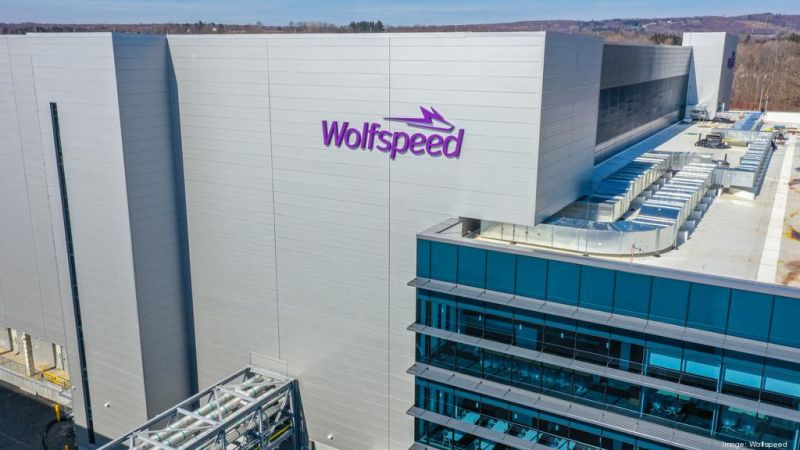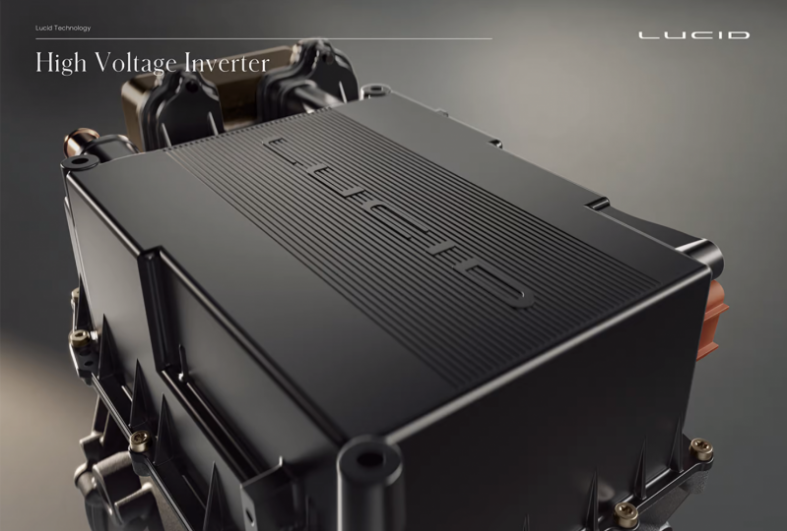BorgWarner Invests $500 Million in Wolfspeed Inc, a Developer of Semiconductors and Silicon Carbide Devices for Electric Vehicles
【Summary】Michigan-based BorgWarner Inc., which is one of the world’s biggest parts suppliers to the auto industry, announced a $500 million investment in Wolfspeed Inc., a developer and manufacturer of semiconductors and silicon carbide devices. Wolfspeed's family of products include Silicon Carbide (SiC) materials for applications such as electric vehicle powertrains, fast charging, 5G, renewable energy and energy storage devices.

Michigan-based BorgWarner, which is one of the world's largest suppliers to the auto industry, announced a $500 million investment in Wolfspeed Inc., a developer and manufacturer of semiconductors and silicon carbide devices.
Wolfspeed's family of products include Silicon Carbide (SiC) materials, power devices and RF devices for applications such as electric vehicle powertrains, fast charging, 5G, renewable energy and energy storage devices. The company's SiC business is growing rapidly due to increased demand for electric vehicle (EV) components.
Using silicon carbide in the inverter of an EV can help to boost the power and range. The widespread adoption of silicon carbide semiconductors for EVs can help support the auto industry's transition to electrification.
As part of the multi-year agreement between BorgWarner and North Carolina-based Wolfspeed, BorgWarner will be entitled to purchase up to $650 million of devices annually as BorgWarner requirements increase. The two companies are also exploring a deeper collaboration to accelerate technology development of electrical components for EVs.
BorgWarner's massive investment in Wolfspeed is part of its "Charging Forward" strategy, which targets $4.5 billion of electric vehicle revenue in 2025, compared to less than $350 million in 2021.
"Silicon carbide-based power electronics play an increasingly important role for our customers as our electric vehicle business continues to accelerate," said Frédéric Lissalde, President and CEO of BorgWarner. "We believe this agreement helps ensure that BorgWarner will have a reliable supply of high-quality silicon carbide devices, which are significant to the company's inverter growth plans.
Silicon carbide has many benefits over traditional silicon chips, including better conductivity and cooling performance in high temperature environments, which makes them well suited for use in the power inverters of electric vehicles.
"Today's announcement demonstrates the creative solutions two collaborative and strategic partners are pursuing to better support the growing demand for silicon carbide devices. BorgWarner has been a strong partner with Wolfspeed for many years, and we are pleased to secure the investment from them which will be used to support our capacity expansion efforts and ensure we have a steady supply of product for their customers," said Gregg Lowe, President and CEO for Wolfspeed.
How Wolfspeed's Silicon Carbide Semiconductors Can Improve the Performance of EVs
In an electric vehicle's powertrain, an inverter converts direct current (DC) to alternating current (AC) and controls the flow of electricity from the battery to the electric motor(s). The benefit of Silicon carbide-based inverters is that they are capable of delivering a more rapid flow of current to the wheels of an EV when the driver demands it, such as during hard acceleration.
The more rapid flow of current allows automakers the option of using smaller electric motors in an EV without sacrificing power output. With up to 80% improvement in the flow of current, electric motors in EVs can be made lighter and operate more efficiently, which also helps to increase driving range. Silicon carbide chips also deliver better thermal conductivity, which is important for high-RPM, high-voltage electric motors to prevent overheating.
Tesla was the first automaker to add silicon carbide metal-oxide-semiconductor field-effect transistors (MOSFETs) to the inverter of the Model 3 sedan that the automaker sourced from its supplier STMicroelectronics.
For the Model 3, the use of silicon carbide in the vehicle's main inverter also reduced the overall weight of it to 4.8kg, which is less than half the weight of the inverter used in the 2019 Nissan Leaf, which weighs in at 11.1kg.
A year ago, General Motors announced a strategic deal with Wolfspeed to develop and provide silicon carbide (SiC) power solutions for GM's future electric vehicles. As a part of the agreement, GM will participate in the "Wolfspeed Assurance of Supply Program" (WS AoSP), which is intended to secure domestic and sustainable materials for EV production.
The silicon carbide technology supplied by Wolfspeed is being used in the integrated power electronics of GM's family of Ultium Drive units that will power the company's next-generation EVs. Wolfspeed's silicon carbide devices will enable GM to develop more efficient EV propulsion systems that can extend the range of its future EVs.
Tesla rival Lucid Group also uses silicon carbide in the power inverter of the Lucid Air sedan. The Lucid Air's inverter features Wolfspeed's XM3 Silicon Carbide power modules. Earlier this year, Lucid entered into a multiyear agreement with Wolfspeed to produce and supply silicon carbide devices to the automaker.
Wolfspeed's XM3 power module contributes to the overall efficiency and power density of the 670 hp electric motor in the Lucid Air.

The Lucid Air's inverter features Wolfspeed's XM3 Silicon Carbide power modules.
Last month, Wolfspeed outlined a multi-year, $6.5 billion expansion effort to increase production of SiC components as demand grows. It includes the installation of additional tools at the company's state-of-the-art, SiC fabrication facility in Mohawk Valley, New York.
The funds will also be used for the construction of a 445-acre silicon carbide materials facility in Wolfspeed's home state of North Carolina. The expansion in North Carolina will increase the company's existing materials capacity by more than 10x, according to Wolfspeed.
The first phase of construction is slated to be complete by the end of 2024.
-


Ford is Testing a New Robotic Charging Station to Assist Drivers of EVs With Disabilities
-


Ford Raises the Prices of the F-150 Lightning Electric Pickup Due to Rising Raw Material Costs
-


The BMW 7-Series to Feature HD Live Maps From HERE Technologies for Hands-Free Highway Driving in North America at Speeds up to 80 MPH
-


AutoX to Use the 'Eyeonic Vision Sensor' from California-based SiLC Technologies for its Robotaxi Fleet in China
-


LG Develops ‘Invisible’ Speaker Sound Technology That Could Revolutionize In-Vehicle Audio
-


Researchers at South Korea’s Chung-Ang University Develop a ‘Meta-Reinforcement’ Machine Learning Algorithm for Traffic Lights to Improve Vehicle Throughput
-


Zeekr’s New 009 Electric Passenger Van is the World’s First EV to Feature CATL’s Advanced ‘Qilin’ Battery With a Range of 510 Miles
-


Redwood Materials is Building an Electric Vehicle Battery Recycling Facility in South Carolina
- The Polestar 5 Sedan Will Have Dual Electric Motors With 884 HP
- Porsche Looking to Boost its Profits as its Prepares for a 2022 IPO That Could Value the Company as High as $81.4 Billion
- Volkswagen’s Software Unit CARIAD Selects Innoviz as its Direct Lidar Supplier for the Automaker's Future Software-Defined Vehicles
- China’s New Intelligent EV company JIDU Launches its Limited-Edition Robocar Called the ‘ROBO-01 Lunar Edition’
- Hyundai Unveils the IONIQ 6 ‘Electric Streamliner’, its Bold Sedan With a 380-Mile Range and 18-Minute Charging Time
- Munro and Associates Offers a Detailed Look of How the Front Seats of the Tesla Model Y Are Bolted to its Battery in New Video
- Baidu CEO Believes That SAE Level-4 Autonomous Driving Systems Will the First to Enter Commercial Use After L2, Skipping Over L3
- Tesla Rival NIO Reports a Record 31,607 Electric Vehicles Deliveries in Q3 as Demand Grows
- California Startup Orbis Brakes Debuts its Revolutionary 'Periodic Wave' Brake Line Developed in Collaboration with NASA
- Toyota Offering Multiple Solutions for Non-Drivable bZ4X Electric SUVs











 About Us
About Us Contact Us
Contact Us Careers
Careers